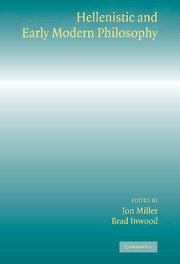Book contents
- Frontmatter
- Contents
- List of Abbreviations
- Notes on Contributors
- Preface
- Introduction
- 1 Stoicism in the Philosophical Tradition
- 2 Early Modern Uses of Hellenistic Philosophy
- 3 Locke's Offices
- 4 Patience sans Espérance: Leibniz's Critique of Stoicism
- 5 Epicureanism in Early Modern Philosophy
- 6 Stoics, Grotius, and Spinoza on Moral Deliberation
- 7 The Discourse on the Method and the Tradition of Intellectual Autobiography
- 8 Subjectivity, Ancient and Modern
- 9 Spinoza and Philo
- 10 Hume's Scepticism and Ancient Scepticisms
- 11 Stoic Naturalism in Butler
- Bibliography of Primary Sources
- Bibliography of Secondary Sources
- Index (general)
- Index (of selected text passages)
10 - Hume's Scepticism and Ancient Scepticisms
Published online by Cambridge University Press: 05 August 2012
- Frontmatter
- Contents
- List of Abbreviations
- Notes on Contributors
- Preface
- Introduction
- 1 Stoicism in the Philosophical Tradition
- 2 Early Modern Uses of Hellenistic Philosophy
- 3 Locke's Offices
- 4 Patience sans Espérance: Leibniz's Critique of Stoicism
- 5 Epicureanism in Early Modern Philosophy
- 6 Stoics, Grotius, and Spinoza on Moral Deliberation
- 7 The Discourse on the Method and the Tradition of Intellectual Autobiography
- 8 Subjectivity, Ancient and Modern
- 9 Spinoza and Philo
- 10 Hume's Scepticism and Ancient Scepticisms
- 11 Stoic Naturalism in Butler
- Bibliography of Primary Sources
- Bibliography of Secondary Sources
- Index (general)
- Index (of selected text passages)
Summary
While all of Hume's readers agree that he is a sceptic – he calls himself a “true” sceptic in the “Conclusion” to Book I of the Treatise and a “mitigated” sceptic in the final Section of the first Enquiry – there is almost no agreement on what this kind of scepticism amounts to. I will limit my contribution to this controversy here to an examination of Hume's first engagement with scepticism, his exploration in “Of scepticism with regard to reason” (T.I.iv. 1; hereafter SwR) of the argument that we should not accept the verdicts of our reasoning; I reconstruct this sceptical argument in Section 1. What Hume wants us to learn from this exploration has also been the focus of much debate amongst his recent readers. There are three main interpretive positions, none of which to me seems satisfactory, but each of which I will suggest contains a germ of truth.
First, some have suggested that Hume's argument against our believing the verdicts of our reasoning is meant to be entirely ad hominem. For, after he has presented it, he says:
My intention then in displaying so carefully the arguments of that fantastic sect, is only to make the reader sensible of the truth of my hypothesis, that all our reasonings concerning causes and effects are deriv'd from nothing but custom; and that belief is more properly an act of the sensitive, than of the cogitative part of our natures. …If belief … were a simple act of the thought, without any peculiar manner of conception, or the addition of a force and vivacity, it must infallibly destroy itself, and in every case terminate in a total suspense of judgment.
(T .183–184, I.iv.1.8; emphasis in original)- Type
- Chapter
- Information
- Hellenistic and Early Modern Philosophy , pp. 251 - 273Publisher: Cambridge University PressPrint publication year: 2003
- 5
- Cited by

